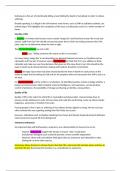Euthanasia is the act of intentionally killing or permitting the death of somebody in order to relieve
suffering.
Broadly speaking, it is illegal in the UK however some forms, such as DNR or palliative sedation, are
entirely legal. This highlights the complexity of the issue as euthanasia comes in a whole number of
forms.
Sanctity of life
In Genesis it is written that humans were created ‘imago Dei’ and therefore human life is holy and
sacred: a gift from God. We should not assume power that is God’s by ending someone else’s life
early; only he can determine when the time is right.
The 10 commandments say not to kill.
- Pence says, “killing someone who wants to die is not murder.”
For many being ‘imago Dei’ is not describing our physical features but more our faculties such as
rationality and free will. It however seems contradictory to think that if it is our abilities to think
rationally and make our own free decisions that gives our life value then in turn this should be the
basis to which such rational decision-making and freedom should be constrained.
Maguire strongly rejects that God alone should decide the time of death for each person as this
seems to imply that we belong to God and are his property when we were given free will to use it as
we wish.
For Joseph Fletcher, sanctity of life is not absolute. He identified positive criteria to judge whether a
being is a human person which included: minimal intelligence, self-awareness, communication,
control of existence, the possibility of change and having an identity, among others.
Quality of life
Quality of life is the extent to which life is meaningful and pleasurable. Human beings have to
possess certain attributes in order to have value and make life worth living; some say these include
happiness, autonomy or freedom from pain.
Forcing people to live in pain or suffering or live without human dignity is wrong. We do not treat
other animals this way regarding ending their life if they are in pain.
However, individuals such as Stephen Hawking have shown that heavily impaired physical attributes
need not prevent a great life from being lived.
Voluntary euthanasia
An important idea with Euthanasia is autonomy; our rational ability to choose how to act.
- Aquinas’ Natural Law suggest this faculty of reason ‘ratio’ is God-given
- Evolutionary biologists such as Darwin provide a more scientific explanation
- However, those with and without faith agree that our autonomy and rationality is what
distinguish us from other species.
Autonomy allows humans to choose how to live their life, and surely this includes when and how to
end their life too. Restricting this freedom is a contradiction to autonomy.
, In natural law, moral acts are conclusions you make using ‘ratio’ in conjunction with the primary
precepts. If you freely and rationally come to the conclusion that euthanasia is the best action, then
it is moral under this theory.
However, the majority of humans do not get the luxury of choosing how they die.
- Life usually ends beyond our control as a result of, for example, illnesses or accidents.
- Not compelling to suggest euthanasia should be permitted for those seriously ill in order to
provide autonomy, as most people do not have this privilege.
The autonomy of someone in significant pain or distress can be questioned.
- A patient in agony, such as Dax Cowan who lost both his hands and 85% of his skin in a fire,
does not have sound mind and judgement to make rational and logical choices.
o However, I do not believe that this should prevent them from exercising their
‘apparent’ autonomy and demanding to end their life. Existence is meaningless
without freedom, and we should be free to end our lives, whatever state we are in.
Rationality may fade but excruciating pain will continue on.
You could argue that allowing such autonomy with euthanasia diminishes the autonomy of others
like doctors; who are forced to go against their Hippocratic oath and end the lives of their patients.
- To avoid a slippery slope, specialist doctors such as Dr Kevorkian ‘Dr Death’ should be
introduced and used to facilitate our God-given autonomy and free will.
Voluntary euthanasia is always moral as it facilitates these divine faculties and whilst some
circumstances, such as being diagnosed with a degenerative brain condition, justify the use of
euthanasia more than others, e.g. your boyfriend broke up with you, all are equally moral.
This is not to suggest that all voluntary euthanasia should be legalised, but instead that the decisions
of all autonomous humans - in regard to purely their own life - are moral and should be respected.
As J.S Mill wrote “over himself the individual is sovereign”.
Non-voluntary euthanasia
The conversation becomes more complex in the face of non-voluntary euthanasia: when a patient is
unable to make the decision themselves.
Allowing doctors or family members to end the life of someone without autonomy lends itself to a
whole host of slippery possibilities:
- A family member could euthanize their relative in order to get money from their will
- A doctor could turn off someone’s life support in order to save the average £1500 a day that
it costs to keep a patient alive on such a machine.
In these cases, Joseph Fletcher’s Situation Ethics provides an adequate solution, suggesting that an
act of non-voluntary euthanasia should be considered moral when the intentions are loving. Killing
somebody without their consent will always be intrinsically wrong however, as one of Fletcher’s six
propositions states, “Love is the end of an act and justifies any means.” If the doctor or family
member has loving intentions then it is moral to euthanasia a nonautonomous sufferer.
However, this argument is not particularly useful as love has no fixed definition and therefore
different people may have varying perceptions of what the most loving thing to do is.




